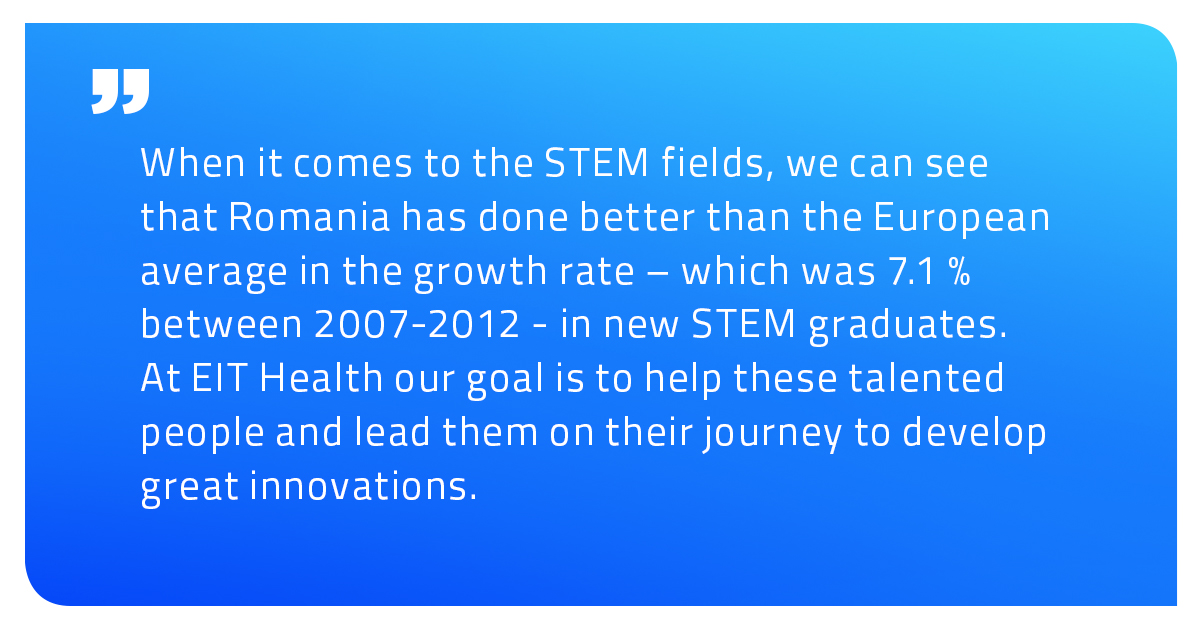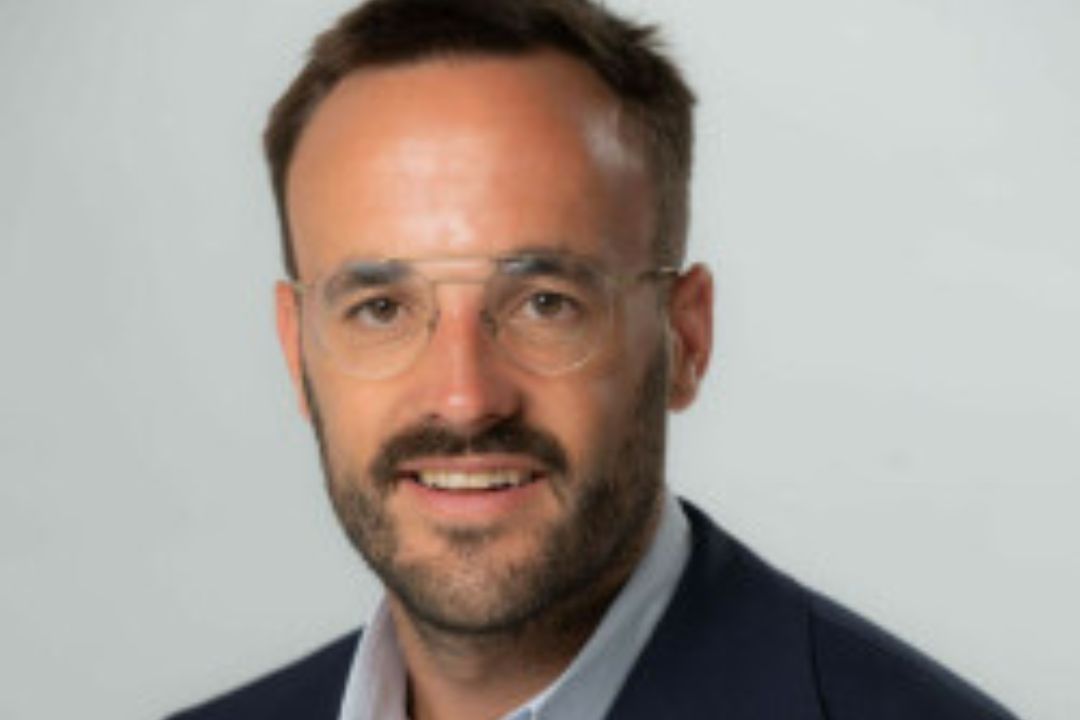21st April 2021
“You can invent alone, you can have a wonderful idea, a very specific solution for a medical problem, but you cannot innovate alone!”, says Cristina Baghiu, EIT Health Alumni Board Member in the latest epsiode of InnoStars Talks. Cristina decided to let us in on a secret of Romanian success of healthcare innovation.
You are the Board Member of EIT Health Alumni Network – a multidisciplinary community of innovators building the future of healthcare. How did you first meet with EIT Health?
I am, as I think, a clear beneficiary of this community because I have no medical experience; I worked more than 15 years in the banking sector, and I joined the EIT Health community in 2019 on a Campus Programme. Back then my focus was to develop my innovation skills and have a better understanding of a complex field like healthcare. Most people think that EIT Health is targeting people with a medical background, but that is not true. The EIT Health community is a very comprehensive learning environment, where you can meet extraordinary people from the academic field as well as experts of small businesses and representatives of huge corporations. I usually say that you can invent alone, you can have a wonderful idea, a very specific solution for a medical problem, but you cannot innovate alone! At EIT Health you can participate in programmes and you get everything you need to advance your innovative ideas; pieces of training, mentoring, access to investors, or business partners.
You are coordinating the Eastern regions of the InnoStars community, and over the last two years, we have seen a huge innovation boom in Romania. What is the secret sauce of Romanian pioneers?
I think it is obvious that the landscape is quite different in the Eastern and Western parts of Europe. It is not always easy in some countries in Eastern Europe to have access to the right education, the right funding and to find the way to develop wonderful ideas.

The European Commission last year published an expert assessment of the current state of the entrepreneurial ecosystem in Romania, which concluded that some of the barriers hindering its development are a lack of predictability, as well as access to finance, and the limited capacity of higher education institutions[1]. However, the Start-up Nation Scoreboard – which
analysed how the EU countries are improving policy frameworks and developing powerful ecosystems for entrepreneurs – placed Romania first for skills and education, second for institutional framework, and fifth for access to talent[2]. When it comes to the STEM fields, we can see that Romania has done better than the European average in the growth rate – which was 7.1 % between 2007-2012 – in new STEM graduates. At EIT Health our goal is to help these talented people and lead them on their journey to develop great innovations.
What do you think makes the Romanian start-up ecosystem more and more successful?
In Romania, we are hungry to prove our value. We are prepared to do long hours of work, find alternative solutions to solve problems. I believe that in Romania we have a gold mine of talents; for example, our IT sector is one of the most active in Europe; the Romanian IT market is expected to reach a volume of EUR 7.3 billion by 2022, according to a study published by The Romanian Employers Association in the Software Industry published (ANIS)[1]. The talent pool is also outstanding: in 2019 Romania held the 8th position within the EU27’s “Employed ICT specialists by educational attainment level – Tertiary education” ranking[2]. Entrepreneurs and young start-uppers are now looking very eagerly to create solutions for the healthcare sector. Healthcare is a transversal field, that can be impacted with technological, scientific, and medical solutions or even with other skills. I think we can say that in Romania, healthcare is actually a new IT sector. According to my experience, people are eager to contribute, to put their expertise together, and to create solutions that help others, that matter. And healthcare matters.
We often hear that Cluj-Napoca is the “Eastern Silicon Valley”…
We can see that in the last years the number of universities, young professionals, tech-oriented people grew rapidly in Romania. Cluj-Napoca has distinguished itself over the years as one of the most important innovation hubs in Romania. The city – which hosted the Start-up Europe Summit in 2019 – became very active in the last 16 years in terms of its start-up ecosystem, and in 2019, an estimated €3M were reportedly invested in Cluj-based start-ups from different industries. It was also included amongst the six finalist cities in the competition for the title of European Capital of Innovation 2020.
It is important to emphasise that Cluj-Napoca is one of the regions supported within the EIT Health Regional Innovation Scheme. Together with 13 other moderate regions in Central, Eastern, and Southern Europe are being equipped with education, acceleration, and innovation opportunities. Start-ups in the region make good use of all these opportunities and are frequent participants in the competitions, outperforming year by year, putting the region on the global map of health innovations.
But of course, it is not only Cluj-Napoca we should mention: the city of Iasi, in the North-East region of Romania, also plays a very important role when it comes to innovation hubs of the country and it is the second city with the most universities. Iasi is the home of the only medical imaging cluster both in Romania and in the EU and is an excellent source of innovators whom we should be proud of. The cluster links private bodies, like hospitals to firms from the IT and software sectors and supports innovators. Iasi is also a European Digital Innovation Hub candidate that is strongly focused on health innovations.
AI has also been in the focus in Romania in the last years, the government even started to elaborate a country-wide AI strategy in 2019. Can you give us an example of a promising local AI development that could support an imminent healthcare challenge?
COVID-19 poses an imminent healthcare challenge where AI can be very useful. We already have a lot of examples of when AI shortened the time to diagnose the COVID-19 virus. For example, in Romania we have an EIT Health accelerated company called XVision, which can analyse radiographies for signs of COVID-19 and tell how badly the lungs are injured. AI has a great potential in healthcare, it can help us to get more accurate and quicker medical decisions.
How can EIT Health help the young innovators in countries which are more moderate in the field of innovations and how can you stimulate youngsters more to innovate?
There are countries in Europe with lots of talents, who have wonderful ideas, but they might lack the information to understand the market, understand business contracts or specific financing and training opportunities. EIT Health is linking everything together; helps the teams to find a programme that fits them based on the company’s maturity phase, helps them to develop their idea, helps them to form a business model, to understand what the teams have to do to defeat the difficulties that block their row. Every team can find support in the organization.
New data shows AI innovation needs skills beyond coding

The largest live dataset of AI start-up talent analysed.
Europe's top health start-ups take centre stage: EIT Health Catapult winners are revealed at HLTH Europe

2025 Catapult programme winners announced.
Finding Europe’s next healthtech leaders: Insights from Antoine D’Hollander

Insights from Antoine D’Hollander, Capricorn Partners.